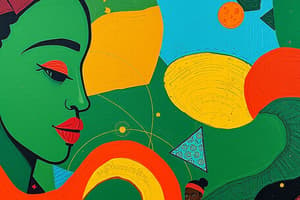Podcast
Questions and Answers
What type of story is 'The Marriage of Anansewa'?
What type of story is 'The Marriage of Anansewa'?
- A novel
- A play (correct)
- A historical biography
- A scientific report
Who is the protagonist of 'The Marriage of Anansewa'?
Who is the protagonist of 'The Marriage of Anansewa'?
- Ananse (correct)
- Onyame
- Chief Sendu
- Akomfo
What is Ananse's primary occupation in 'The Marriage of Anansewa'?
What is Ananse's primary occupation in 'The Marriage of Anansewa'?
- Farming
- Managing
- Teaching
- Consultant (correct)
What motivates Ananse's actions in 'The Marriage of Anansewa'?
What motivates Ananse's actions in 'The Marriage of Anansewa'?
What is the central theme of 'The Marriage of Anansewa'?
What is the central theme of 'The Marriage of Anansewa'?
Flashcards
Who is Efua Sutherland?
Who is Efua Sutherland?
The author of The Marriage of Anansewa.
What is the genre of 'The Marriage of Anansewa'?
What is the genre of 'The Marriage of Anansewa'?
A play that blends traditional Ghanaian storytelling with modern theatrical techniques.
Who is Anansewa?
Who is Anansewa?
Ananse's beautiful daughter, central to his plan to secure wealth and status through marriage.
Who is Ananse?
Who is Ananse?
Signup and view all the flashcards
What is a key theme in 'The Marriage of Anansewa'?
What is a key theme in 'The Marriage of Anansewa'?
Signup and view all the flashcards
Study Notes
-
"The Marriage of Anansewa" is a play written by Ghanaian playwright, novelist, and academic, Efua Sutherland
-
The play blends traditional African storytelling with modern theatrical techniques
-
It employs a storytelling format, with Ananse, the spider trickster figure from Akan folklore, as the narrator
-
The play satirizes aspects of Ghanaian society, particularly the pursuit of wealth and status through marriage
Plot Overview
-
Ananse, deeply in debt, devises a plan to solve his financial problems by advertising his daughter, Anansewa, to several wealthy and influential potential suitors
-
He sends out a "marriage brochure" detailing Anansewa's virtues and accomplishments, sparking interest from chiefs, politicians, and military officers
-
As suitors arrive, Ananse weaves elaborate stories and manipulates events to increase their interest and drive up the "bride price"
-
Ananse creates a false narrative by pretending Anansewa has died to test the suitors' true feelings and commitment towards her
-
The play concludes with the revelation that Anansewa is not really dead
-
Anansewa chooses her own husband, a humble and educated young man named Teacher, who loves her for who she is, not for her potential to bring wealth or status
Characters
-
Ananse: The protagonist and narrator, a trickster figure who uses his wit and cunning to manipulate situations for his own gain
-
Anansewa: Ananse's beautiful and intelligent daughter, who is the object of the suitors' desires; she has her own agency and eventually chooses her own partner
-
The Suitors: Chiefs, politicians, and military officers who represent different aspects of Ghanaian society and are all vying for Anansewa's hand in marriage
-
Chief Who-Is-Chief: A wealthy and influential traditional ruler
-
Ramatu: A wealthy business woman
-
Colonel Teko: A high-ranking military officer
-
Politician
-
-
Teacher: A humble and educated young man who truly loves Anansewa for who she is
Themes
-
Critique of Materialism and Greed: The play satirizes the obsession with wealth and status in Ghanaian society, as demonstrated by the suitors' eagerness to marry Anansewa for financial gain or political advantage
-
The Power of Storytelling: Ananse's ability to weave elaborate stories and manipulate events highlights the power of storytelling to shape perceptions and influence outcomes
-
Tradition vs. Modernity: The play explores the tensions between traditional customs, such as arranged marriages and bride prices, and modern values, such as individual choice and love
-
Female Agency: Anansewa is not merely a passive object of exchange, despite her father wanting a wealthy man for her; she has her own desires and ultimately chooses her own partner, asserting her agency
-
Corruption: Sutherland critiques corruption among people in high places
Dramatic Techniques
-
Storytelling: The play uses a storytelling format, with Ananse as the narrator, to engage the audience and provide commentary on the action
-
Satire: The play employs satire to critique aspects of Ghanaian society, such as materialism, corruption, and the abuse of power
-
Humor: The play is filled with humor, both through Ananse's witty remarks and through the exaggerated portrayals of the suitors
-
Music and Dance: Traditional Ghanaian music and dance are incorporated into the play to create a vibrant and culturally rich theatrical experience
-
Audience Participation: The play often involves audience participation, blurring the lines between the stage and the audience and creating a sense of community
Social Commentary
-
Critique of Bribery and Corruption: The suitors' willingness to offer gifts and bribes to Ananse in exchange for Anansewa's hand in marriage highlights the prevalence of corruption in Ghanaian society
-
Questioning Traditional Practices: The play challenges traditional marriage practices, such as arranged marriages and bride prices, and raises questions about their relevance in modern society
-
Celebrating Education and Humility: The play celebrates the values of education and humility, as embodied by Teacher, who is portrayed as a more desirable partner than the wealthy and powerful suitors
Studying That Suits You
Use AI to generate personalized quizzes and flashcards to suit your learning preferences.




